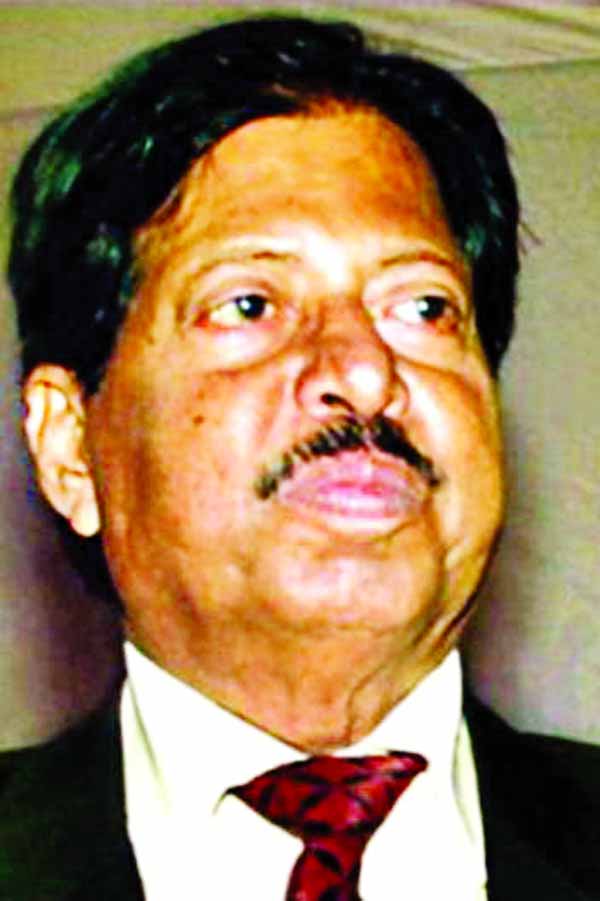
Staff Reporter :
Legendary vocalist Abdul Jabbar whose powerful songs inspired the freedom fighters during the Liberation War is no more. He was 79.
Jabbar, best known for his patriotic songs like ‘salam salam hajar salam’ and ‘sharhe shaat koti manusher aaj ekti naam,’ breathed his last at 9:27am at Bangabandhu Sheikh Mujib Medical University (BSMMU) in the capital on Wednesday. Jabbar’s body
was taken to Marqazul Islam mosque at Mohammadpur for a bath and, from there, his body was taken to his residence at Bhuter Gali in the capital on Wednesday.
His body will be kept at BIRDEM Hospital mortuary tonight.
His first Namaj-e-Janaza will be held at the Bangladesh Betar at Sher-e-Bangla Nagar on Thursday morning.
Jabbar’s body will be taken to Central Shaheed Minar where people from all walks of life will pay their last respect to the Independence Award-winning singer, said Jabbar’s son Babu Jabbar.
The second Namaj-e-Janaza will be held on the Dhaka University Central Mosque premises in the noon.
He will be buried at Mirpur Martyred Intellectuals’ Graveyard in the afternoon.
President Abdul Hamid and Prime Minister Sheikh Hasina expressed deep shock at the death of Jabbar in separate condolence messages.
Hearing the news of death of the eminent Swadhin Bangla Betar Kendra artiste, family members, friends and peers of the singer rushed to the hospital.
‘Abdul Jabbar’s contributions to our liberation war through his unforgettable songs will always be remembered by all’, said Information Minister Hasanul Haque Inu.
‘It is an irreparable loss for us. Abdul Jabbar was a singer par excellence. His songs ringed through the air since the 1960s and his voice inspired thousands of freedom fighters during the liberation war’, said Cultural Affairs Minister Asaduzzaman Noor.
Abdul Jabbar was born on November 7, 1938 in Kushtia, one of the few places vibrant with music and cultural practices.
From an early age, Jabbar showed interest in music and his parents also encouraged him to take up music seriously.
Jabbar began taking lessons on singing from local music teachers like Mohammad Osman, Moksed Ali Sai and Lutful Haque.
In 1958, Jabbar enlisted himself as a radio artiste, where his singing attracted eminent music director Robin Ghosh, who eventually roped Jabbar in for playback numbers.
It was through playbacks, Jabbar endeared himself to thousands. Beginning with Ehtesham’s film Natun Sur, Jabbar sung for films like Sangam, Jiban Theke Neya, Alingan, Dwip Nive Jay, Nacher Putul, Apanpar, Etatuku Asha, Alor Michhil, Suryagrahan, Tufan, Sareng Bou and many others.
Among Jabbar’s most popular playback numbers include Ore Nil Dariya and Tumi Ki Dekhechho Kabhu.
Besides playbacks which made Jabbar a household name in the 1960s, the singer made a permanent niche through songs that he rendered during the liberation war at Swadhin Bangla Betar Kendra. Salam Salam Hajar Salam and Banglar Swadhinota Anlo Ke are two of the songs that were immensely popular during the liberation war.
Abdul Jabbar received Ekushey Padak in 1980 and Independence Award in 1996.
Legendary vocalist Abdul Jabbar whose powerful songs inspired the freedom fighters during the Liberation War is no more. He was 79.
Jabbar, best known for his patriotic songs like ‘salam salam hajar salam’ and ‘sharhe shaat koti manusher aaj ekti naam,’ breathed his last at 9:27am at Bangabandhu Sheikh Mujib Medical University (BSMMU) in the capital on Wednesday. Jabbar’s body
was taken to Marqazul Islam mosque at Mohammadpur for a bath and, from there, his body was taken to his residence at Bhuter Gali in the capital on Wednesday.
His body will be kept at BIRDEM Hospital mortuary tonight.
His first Namaj-e-Janaza will be held at the Bangladesh Betar at Sher-e-Bangla Nagar on Thursday morning.
Jabbar’s body will be taken to Central Shaheed Minar where people from all walks of life will pay their last respect to the Independence Award-winning singer, said Jabbar’s son Babu Jabbar.
The second Namaj-e-Janaza will be held on the Dhaka University Central Mosque premises in the noon.
He will be buried at Mirpur Martyred Intellectuals’ Graveyard in the afternoon.
President Abdul Hamid and Prime Minister Sheikh Hasina expressed deep shock at the death of Jabbar in separate condolence messages.
Hearing the news of death of the eminent Swadhin Bangla Betar Kendra artiste, family members, friends and peers of the singer rushed to the hospital.
‘Abdul Jabbar’s contributions to our liberation war through his unforgettable songs will always be remembered by all’, said Information Minister Hasanul Haque Inu.
‘It is an irreparable loss for us. Abdul Jabbar was a singer par excellence. His songs ringed through the air since the 1960s and his voice inspired thousands of freedom fighters during the liberation war’, said Cultural Affairs Minister Asaduzzaman Noor.
Abdul Jabbar was born on November 7, 1938 in Kushtia, one of the few places vibrant with music and cultural practices.
From an early age, Jabbar showed interest in music and his parents also encouraged him to take up music seriously.
Jabbar began taking lessons on singing from local music teachers like Mohammad Osman, Moksed Ali Sai and Lutful Haque.
In 1958, Jabbar enlisted himself as a radio artiste, where his singing attracted eminent music director Robin Ghosh, who eventually roped Jabbar in for playback numbers.
It was through playbacks, Jabbar endeared himself to thousands. Beginning with Ehtesham’s film Natun Sur, Jabbar sung for films like Sangam, Jiban Theke Neya, Alingan, Dwip Nive Jay, Nacher Putul, Apanpar, Etatuku Asha, Alor Michhil, Suryagrahan, Tufan, Sareng Bou and many others.
Among Jabbar’s most popular playback numbers include Ore Nil Dariya and Tumi Ki Dekhechho Kabhu.
Besides playbacks which made Jabbar a household name in the 1960s, the singer made a permanent niche through songs that he rendered during the liberation war at Swadhin Bangla Betar Kendra. Salam Salam Hajar Salam and Banglar Swadhinota Anlo Ke are two of the songs that were immensely popular during the liberation war.
Abdul Jabbar received Ekushey Padak in 1980 and Independence Award in 1996.

